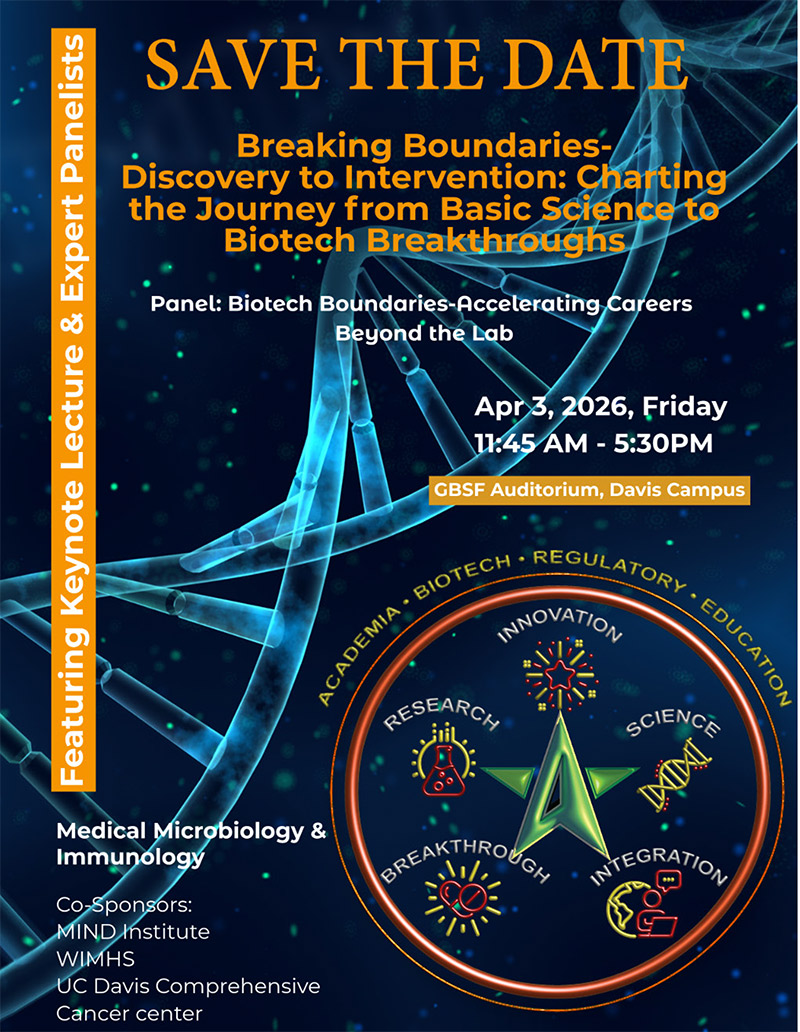MMI Faculty in the News
Two MMI faculty included in the 2025 Highly Cited Researcher list from Clarivate
 Andreas Bäumler, Ph.D.
Andreas Bäumler, Ph.D.
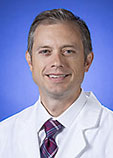 George Thompson, M.D.
George Thompson, M.D.
Two of the 10 UC Davis researchers included in the 2025 Highly Cited Researcher list from Clarivate are members of the Department of Medical Microbiology and Immunology: George R. Thompson and Andreas J. Bäumler. Each Highly Cited Researcher selected has authored multiple Highly Cited Papers which rank in the top 1% by citations for their field and publication year in the Web of Science over the past decade.
Why monkey studies may mislead research on cancer immunotherapy drugs targeting TIGIT
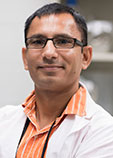 Jogender Tushir-Singh, Ph.D.
Jogender Tushir-Singh, Ph.D.
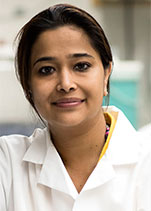 Sanchita Bhatnagar, Ph.D.
Sanchita Bhatnagar, Ph.D.
Jogender Tushir-Singh, Ph.D. and Sanchita Bhatnagar, Ph.D., associate professors in the Department of Medical Microbiology and Immunology are the co-authors of a new study that was published in the Journal of Biological Chemistry finds that TIGIT, an immune checkpoint receptor targeted by cancer immunotherapy drugs, triggers a different response in rhesus macaques compared to humans.
The findings could have implications for cancer immunotherapy drugs targeting TIGIT.
UC Davis scientists find a microbial molecule that restores gut and liver health
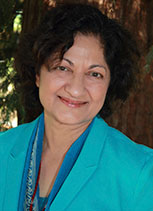 Satya Dandekar, Ph.D.
Satya Dandekar, Ph.D.
UC Davis Health researchers have discovered that a natural molecule made by gut bacteria can reverse liver damage and repair the gut lining after aflatoxin exposure. The treatment may offer a new, non-toxic way to prevent and treat non-alcoholic fatty liver disease (NAFLD), a growing health problem affecting more than 1 in 4 adults in the U.S.
The study revealed that 10-hydroxystearic acid (10-HSA), a compound produced by Lactobacillus bacteria, successfully restored gut-liver health in mice exposed to aflatoxin. Aflatoxin is a toxic substance made of mold commonly found in peanuts, corn and other crops. It is known to cause liver injury.
“This is the first time a single microbial molecule has been shown to repair both the liver and the gut together,” said the lead author, Satya Dandekar. Dandekar is a distinguished professor and the chair of the Department of Medical Microbiology and Immunology at UC Davis Health.
X chromosome switch offers hope for girls with Rett syndrome
 Sanchita Bhatnagar, Ph.D.
Sanchita Bhatnagar, Ph.D.
Researchers led by UC Davis Health scientist Sanchita Bhatnagar have developed a promising gene therapy that could treat Rett syndrome. The therapy works on reactivating healthy but silent genes responsible for this rare disorder and possibly other X-linked conditions, such as fragile X syndrome.
Their findings were published in Nature Communications.
A single genetic mutation may have made humans more vulnerable to cancer than chimpanzees
 Jogender Tushir-Singh, Ph.D.
Jogender Tushir-Singh, Ph.D.
New Study published in Nature Communications by senior author, Jogender Tushir-Singh an associate professor in the Department of Medical Microbiology and Immunology, “Evolutionary regulation of human Fas ligand (CD95L) by plasmin in solid cancer immunotherapy”
“Humans have a significantly higher rate of cancer than chimpanzees and other primates. There is a lot that we do not know and can still learn from primates and apply to improve human cancer immunotherapies,” said Tushir-Singh. “Regardless, this is a major step toward personalizing and enhancing immunotherapy for the plasmin-positive cancers that have been difficult to treat.” UC Davis Health article »
2024
UC Davis researchers help decode the cause of aggressive breast cancer in women of color
 Sanchita Bhatnagar, Ph.D.
Sanchita Bhatnagar, Ph.D.
UC Davis Researcher, Sanchita Bhatnagar and her team have been studying a protein called TRIM37 and its relationship in breast cancer diagnoses and deaths in Black women for over 10 years. Read more about her research to help decode the cause of aggressive breast cancer in women of color here: UC Davis researchers help decode the cause of aggressive breast cancer in women of color.
Congratulations to Andreas Bäumler for making the ‘Highly Cited Researchers 2024’ list
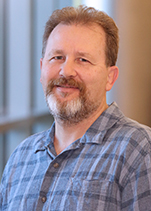 Andreas Bäumler, Ph.D.
Andreas Bäumler, Ph.D.
One of the 9 UC Davis researchers included in the 2024 Highly Cited Researcher list from Clarivate is a member of the Department of Medical Microbiology and Immunology: Distinguished Professor Andreas Bäumler. Highly Cited Researchers are selected because they authored multiple Highly Cited Papers which rank in the top 1% by citations for their field and publication year in the Web of Science over the past decade.
2024 American Society for Cell Biology Fellow
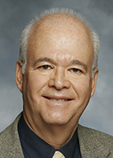 Michael Leibowitz, M.D., Ph.D.
Michael Leibowitz, M.D., Ph.D.
Congratulations to Michael Leibowitz for being selected as the American Society for Cell Biology Fellow.
This honor is bestowed upon members by their peers. This is a life-time recognition of Professor Michael Leibowitz’s meritorious efforts to advance cell biology and/or its applications, his work in service to the Society and his ongoing loyalty to American Society for Cell Biology.
Please join us in congratulating him for this recognition of his accomplishments and service.
The Link Between a Mother’s Lupus and a Child’s Autism
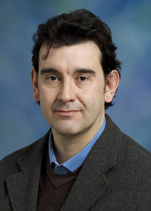 Paul Ashwood, Ph.D.
Paul Ashwood, Ph.D.
“For quite a while, there’s been a link between maternal autoimmune diseases and risk for having a child with autism,” says Paul Ashwood, a professor of medical microbiology and immunology at the University of California, Davis and the MIND Institute, which focuses on autism and other neurodevelopmental conditions.
At the turn of the 21st century, the prevalence of autism spectrum disorder among American children was roughly 1 in 150. That’s according to data collected by the Autism and Developmental Disabilities Monitoring Network of the U.S. Centers for Disease Control and Prevention. A decade later, in 2010, the prevalence had risen to 1 in 68 children. By 2020, it had climbed again—to 1 in 36 children. “The prevalence of Autism Spectrum Disorder (ASD) has increased dramatically in recent decades, supporting the claim of an autism epidemic,” wrote the authors of a 2020 study in the journal Brain Sciences.
2023 UC Davis School of Medicine Dean’s Award for Excellence
Distinguished Professor Andreas Bäumler has been selected as a recipient of the 2023 UC Davis School of Medicine Dean’s Award for Excellence. This award recognizes his outstanding contributions as a transformative leader in the area of research. Congratulations!
An anti-inflammatory curbs fungi spread causing serious blood infections
Study finds a common drug that can be used to limit yeast blooming in the gut after antibiotics use
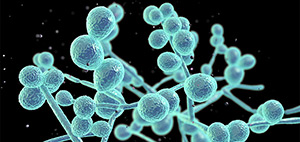
A team of UC Davis Health researchers discovered that a common anti-inflammatory drug, mesalamine, can replace the work of good bacteria in fighting the nasty fungus Candida albicans in the gut.
C. albicans, or candida, is known to cause yeast infections. In some cases, it develops into invasive candidiasis, a potentially fatal infection occurring mostly in patients with compromised immunity.
The researchers found that this fungus can’t grow without an oxygen supply. Their study in mice showed that the drug can maintain a low oxygen (hypoxia) environment that prevents fungal bloom in the gut.
Distinguished Professor Andreas Bäumler, Ph.D. is the lead author of this study.
Read more about this study in Cell Host & Microbe »
2024 Cultivating Team Science Seed Grant Award
 Professors Andreas Bäumler (left) and Derek Bays (right)
Professors Andreas Bäumler (left) and Derek Bays (right)
Congratulations to Distinguished Professor Andreas Bäumler and Assistant Professor Derek J. Bays for receiving the 2024 Cultivating Team Science Seed Grant Award.
Congratulations to Jose Torres, Recipient of the 2022-2023 UC Davis Continuing and Professional Education ‘Outstanding Service Award'
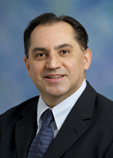 Jose V. Torres, Ph.D.
Jose V. Torres, Ph.D.
Professor Jose Torres is the recipient of the 2022-2023 UC Davis Continuing and Professional Education ‘Outstanding Service Award’.
“Jose Torres has been a strong advocate for inclusivity within the UC Davis community by readily accepting post-baccalaureate and open-campus students into his courses, promoting a more diverse and dynamic learning environment. His dedication to the success and growth of our educational programs continues to be an invaluable asset to UC Davis Continuing and Professional Education.”
Congratulations to Andreas Bäumler and Renée Tsolis, School of Medicine researchers elected as AAAS fellows
 Andreas Bäumler, Ph.D.
Andreas Bäumler, Ph.D.
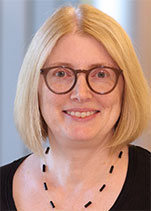 Renée Tsolis, Ph.D.
Renée Tsolis, Ph.D.
Andreas Bäumler, Ph.D. and Renée Tsolis, Ph.D. have been elected as an AAAS fellows.
AAAS fellows are scientists, engineers and innovators who have been recognized for their achievements in science, including research, teaching, administration and science communication.
Do sugar-free candy and gum give you gas?
 Jee-Yon Lee, Ph.D.
Jee-Yon Lee, Ph.D.
We are proud to announce the recently published “High fat intake sustains sorbitol intolerance after antibiotic-mediated Clostridia depletion from the gut microbiota” by Medical Microbiology and Immunology’s Jee-Yon Lee, Ph.D. of the Andreas Bäumler research lab.
2023
Two MMI faculty included in the 2023 Highly Cited Researcher list from Clarivate
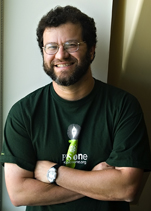 Jonathan Eisen, Ph.D.
Jonathan Eisen, Ph.D.
 Andreas Bäumler, Ph.D.
Andreas Bäumler, Ph.D.
Two of the 13 UC Davis researchers included in the 2023 Highly Cited Researcher list from Clarivate are members of the Department of Medical Microbiology and Immunology: Jonathan Eisen and Andreas Bäumler. Each Highly Cited Researcher selected has authored multiple Highly Cited Papers which rank in the top 1% by citations for their field and publication year in the Web of Science over the past decade.
Researchers identify ‘switch’ to activate cancer cell death
 Jogender Tushir-Singh, Ph.D.
Jogender Tushir-Singh, Ph.D.
A research team from the UC Davis Comprehensive Cancer Center has identified a crucial epitope (a protein section that can activate the larger protein) on the CD95 receptor that can cause cells to die. This new ability to trigger programmed cell death could open the door for improved cancer treatments. The findings were published Oct. 14 in the Nature journal Cell Death & Differentiation.
“We have found the most critical epitope for cytotoxic Fas signaling, as well as CAR T-cell bystander anti-tumor function,” said Jogender Tushir-Singh, an associate professor in the Department of Medical Microbiology and Immunology and senior author of the study.
California Faces Increased Risk of Valley Fever This Summer
KQED's The California Report
 Satya Dandekar, Ph.D.
Satya Dandekar, Ph.D.
Following the state’s record-breaking rainfall in the winter, and now its dry heat, public health officials are worried about an uptick in Valley fever infections. Reporter: Izzy Bloom, The California Report
Listen to interview here on Apple Podcasts
CBS KOVR 13 News coverage on ‘Weather conditions cause Valley fever fears to increase in Northern California with Stuart Cohen
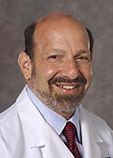 Stuart H. Cohen, M.D.
Stuart H. Cohen, M.D.
Fears over Valley fever are ramping up as the California Department of Public Health warns our historically wet winter, followed by dry and dusty conditions could be the perfect storm for increased risk of contracting the virus.
Valley fever, also known as coccidioidomycosis, is a disease caused by a fungus that grows in the soil and dirt. Hotbed areas are typically the Central Valley, but Stuart Cohen, M.D., the co-director for the Center for Valley Fever, said an upward trend in temperatures in recent years is contributing to a rise in Sacramento and the Northern California region.
CBS KOVR 13 News link: Weather conditions cause Valley fever fears to increase in Northern California - CBS Sacramento (cbsnews.com)
Andreas Bäumler Elected to National Academy of Sciences
Three professors from the University of California, Davis, including Andreas Bäumler, Ph.D., have been elected as members of the National Academy of Sciences. They are among 120 new members and 23 international members announced by the academy May 2. Members are elected in recognition of their contributions to original research. Membership in the academy is considered one of the highest honors a scientist can achieve.
2022
Physicians urged to consider fungal infections as possible cause for lung inflammation
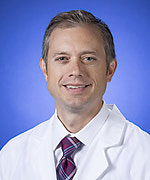 George Thompson, M.D.
George Thompson, M.D.
Infectious diseases expert George Thompson has been studying and treating fungal diseases for over two decades. He monitors their spread, symptoms and relative risks. Lately, he has been more concerned about a rising threat: the spread of disease-causing fungi outside of their traditional hot spots.
In a commentary published in Annals of Internal Medicine, Thompson and his co-author from the Mycotic Diseases Branch at the Centers for Disease Control and Prevention Tom Chiller raised the alarm. They noted the expanding presence and emerging risks from three endemic fungal diseases: histoplasmosis, blastomycosis and coccidioidomycosis (Valley fever).
“These three fungal diseases usually inhabit specific U.S. regions conducive to their survival,” said Thompson. He is a professor at the UC Davis School of Medicine in the Department of Internal Medicine, Division of Infectious Diseases, and the Department of Medical Microbiology and Immunology. “Recently, we are finding more cases of these diseases outside their known areas, taking clinicians and patients by surprise.”
Read more about this news article »
Two from department of Medical Microbiology and Immunology (MMI) among most highly cited researchers
 Jonathan Eisen, Ph.D.
Jonathan Eisen, Ph.D.
 Andreas Bäumler, Ph.D.
Andreas Bäumler, Ph.D.
Two current faculty members of the Department of Medical Microbiology and Immunology in the School of Medicine at UC Davis have made this year’s list of scientists whose papers have been cited most frequently by other researchers.
They are among 6,938 researchers around the world identified on November 15, 2022, by the global analytics firm Clarivate whose publications rank in the top 1% by citations for field of research and publication year in the Web of Science citation index.
With the Highly Cited Researchers list Clarivate’s Institute for Scientific Information identifies and celebrates exceptional individual researchers who are having a significant impact on the research community as evidenced by the rate at which their work is being cited by their peers.
MMI researchers on this year’s list include:
Jonathan Eisen, Ph.D., Professor of Ecology and Evolution and Adjunct Professor of Medical Microbiology and Immunology, who studies the ecology, evolution and function of microbes and microbial communities.
Andreas J. Baumler, Ph.D., Professor and Vice Chair of Research in the Department of Medical Microbiology and Immunology, who studies how Salmonella manipulates host factors that control the growth conditions for host-associated microbial communities in the gut.
The United States is the institutional home to 38.3% of this year’s highly cited researchers, followed by Mainland China with 16.2%, and the United Kingdom with 8.0%.
Cell Press shares the voices of leading experts, including Stefan Rothenburg, on what they see as the most pressing questions and directions for the community
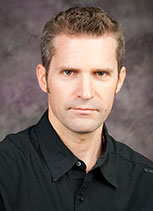 Stefan Rothenburg, Ph.D.
Stefan Rothenburg, Ph.D.
Amidst the COVID-19 pandemic, we now face another public health emergency in the form of monkeypox virus. As of August 1, the Centers for Disease Control and Prevention report over 23,000 cases in 80 countries. An inclusive and global collaborative effort to understand the biology, evolution, and spread of the virus as well as commitment to vaccine equity will be critical toward containing this outbreak. We share the voices of leading experts in this space on what they see as the most pressing questions and directions for the community.
Stefan Rothenburg shared, “Poxvirus evolution In medical school, I told my students that they will likely see poxvirus outbreaks in their careers. However, the magnitude and rapid spread of this global outbreak is unexpected and deeply concerning. Entry of poxviruses into cells is independent of host-species-specific receptors, and poxviruses thus have the potential to infect many different species. Sequence data from variola virus, which caused human smallpox, indicate that poxviruses have relatively low mutation rates when they are transmitted within one species. However, poxviruses have genomes that are less size constrained than most other viruses. This flexibility can help them to adapt to new hosts. Adaptive genomic changes include gene duplications, gene loss, recombination with closely or distantly related viruses, and horizontal gene transfer from their hosts to gain new genes. Moreover, low-frequency single nucleotide polymorphisms might be beneficial in the new host and become more abundant. This might explain the unexpected high number of ‘‘mutations’’ found in the viruses of the current outbreak. One key question is how these variations affect monkeypox virus (MPXV) transmissibility and virulence. Because of the rapid increase in MPXV cases, there is a high chance that the virus is going to stay with us for a long time and potentially establish itself in pets and wildlife worldwide. An expanded virus reservoir greatly increases the risk that more adaptive mutations will arise, for example, after recombination with other poxviruses. We urgently need a coordinated and well-funded surveillance of poxvirus infections to be able to detect and quickly react to new variants of concern.”
Read more on Cell Press or here (PDF).
Andreas Bäumler receives medal for excellent contributions to research on intestinal microbiology

Andreas Bäumler, Ph.D. has been honored with the “Tissier’s Medal” by the Japanese Bifidus Foundation for his groundbreaking contributions to the field of intestinal microbiology. The medal was designed in remembrance of Henri Tissier, a French pediatrician from the Pasteur Institute in Paris, who discovered Bifidobacteria, commonly named Bifidus, in the human gut in 1899.
This prestigious award, given out annually since 1988, recognizes researchers who contributed significantly to the development of research in the area of intestinal microbiology. Andreas Bäumler received the award after delivering a plenary lecture at the 26th Annual Meeting of the Intestinal Microbiology Society organized by the Japanese Bifidus Foundation July 7-8, 2022 in Tokyo.
Maladaptation after a virus host switch leads to increased activation of the pro-inflammatory NF-κB pathway
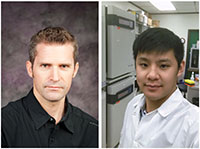 Stefan Rothenburg, Ph.D. and Huibin Yu
Stefan Rothenburg, Ph.D. and Huibin Yu
New research from UC Davis scientists reveals that the maladaptation after a virus host switch, in which a poxvirus substantially gained in virulence, can have unexpected consequences such as activating pro-inflammatory pathways.
 The poxvirus myxoma virus naturally infects American rabbit species (brush rabbit and tapeti), in which it causes a localized, benign infection. In European rabbits, which include the pet rabbits, myxoma virus causes a highly lethal disease called myxomatosis.
The poxvirus myxoma virus naturally infects American rabbit species (brush rabbit and tapeti), in which it causes a localized, benign infection. In European rabbits, which include the pet rabbits, myxoma virus causes a highly lethal disease called myxomatosis.
The work of former graduate student Huibin Yu from the laboratory of Stefan Rothenburg, showed that surprisingly the antiviral protein kinase R (PKR) from brush rabbits was inhibited better than PKR from European rabbits by a myxoma virus protein, thus not correlating with virulence. The intermediate inhibition of European rabbit PKR, however resulted in activation of the pro-inflammatory NF-κB pathway, which may contribute to rapid viral dissemination and increased virulence of myxoma virus in European rabbits.
The study demonstrates that maladaptation of viral immune antagonists can result in substantially different immune responses in aberrant hosts and might serve as a model that can explain increases in virulence after virus host switches.
The study was published in the Proceedings of the National Academy of Sciences of the United States of America and can be found here »
‘Friendly’ gut bacteria may eliminate pathogens by competing for energy resources
 Megan Liou
Megan Liou
New research from scientists at UC Davis Health provides clues for how friendly bacteria in the gut — probiotics — may help eradicate bacterial pathogens like Salmonella by competing with them for needed resources.
The study, published in Cell Host & Microbe, shows that the availability of needed nutrients alone doesn’t define where bacteria — including pathogens like Salmonella — can survive and thrive in the gut.
“These insights provide a better understanding of the nutritional basis of intestinal colonization and can help inform efforts to develop probiotics to combat infection,” said Megan Liou, a Ph.D. candidate in the Bäumler Lab at UC Davis and the first author of the study.
Improving Pig Diets to Prevent Antimicrobial Resistance
Researchers from UC Davis and universities in Denmark and the Netherlands are joining forces in a new research project to reduce the need for antibiotics in pig production by improving intestinal resilience in developing piglets. The $21.2 million, 5-year PIG-PARADIGM project is funded by the Novo Nordisk Foundation.
Overuse of antibiotics contributes to bacteria becoming resistant to antimicrobials. More than 700,000 people die each year from infections that are resistant to most, or all, antibiotics. The World Health Organization predicts that in just 30 years antimicrobial resistance will become the third leading cause of death globally.
UC Davis will receive $3.8 million as part of the grant. Maria Marco, professor in the food science and technology department will lead the research to understand how pig diets can be improved. The team also includes Professor Andreas Bäumler with UC Davis Health, Professor Titus Brown with the School of Veterinary Medicine, Peng Ji, assistant professor in the Department of Nutrition, Associate Professor Yanhong Liu, Department of Animal Science and Professor Carolyn Slupsky with the departments of food science and technology, and of nutrition. The scientists want to understand how to increase pigs' natural defenses and immunity in the gut.
Read More about this news article »
Placenta may hold clues for early autism diagnosis and intervention
 Janine LaSalle, Ph.D.
Janine LaSalle, Ph.D.
New UC Davis MIND Institute research has identified a novel human gene linked to fetal brain development and autism spectrum disorder (ASD). The discovery also links the gene to the mother’s early prenatal vitamin use and placental oxygen levels.
In a study published Feb. 16 in Genome Biology, the researchers used genomic sequencing to find a DNA methylation signature in the placenta of newborns eventually diagnosed with autism. This signature mark was linked to early fetal neurodevelopment.
“By taking an unbiased approach to investigating placental DNA methylation differences, we discovered a novel gene in a poorly mapped region of the genome associated with autism, ” said Janine LaSalle, lead author on the study and professor of microbiology and immunology at UC Davis Health.
Satya Dandekar elected to American Academy of Microbiology
 Satya Dandekar, Ph.D.
Satya Dandekar, Ph.D.
Satya Dandekar, Ph.D., has been elected into the American Academy of Microbiology, an honorific leadership group within the American Society for Microbiology (ASM). Fellows are elected annually through a highly selective, peer-review process.
Dandekar, a professor of microbiology and the chairperson of the Department of Medical Microbiology and Immunology, is among 65 fellows selected in 2022. Fellows are chosen based on their records of scientific achievement and original contributions that have advanced microbiology.
Dandekar’s pioneering research on HIV/AIDS revealed the direct and devastating impact of the virus on the gut very early in the infection. Within just a few days to weeks, the virus damages the gut epithelial lining and impairs the gastrointestinal mucosal lymphoid tissue. Both are critical for generating the body’s immune response for defending against infections. The findings supported changes in the treatment protocols for HIV, including starting anti-HIV therapy early in the infection to achieve better clinical outcomes.
Join us in welcoming Sanchita Bhatnagar
 Sanchita Bhatnagar, Ph.D.
Sanchita Bhatnagar, Ph.D.
Join us in welcoming Sanchita Bhatnagar, Ph.D. She will contribute to the depth and strength of our research and academic community. Upon her arrival to campus, she is already engaged with teaching and serving to mentor students. Her research program’s mission is to advance understanding of the epigenetic regulation of mammalian gene expression. Her research is driven to develop cutting-edge tools, reagents, and therapeutics for critical areas of medical research, with an emphasis on childhood neurodevelopment disorders and breast cancer. She has developed a new approach to stop the effects of TRIM37 and, hopefully, prevent or significantly delay the spread of triple-negative breast cancer. This could also lower the disease’s defense against chemotherapy. “This is an important proof-of-concept much needed for the bench-to-clinic transition of these important findings,” comments Bhatnagar. In another project, Bhatnagar's team has developed a new gene therapy-based approach targeting mechanisms of X chromosome inactivation, which holds promise for Rett syndrome female patients. We are excited she has joined us and will continue her research programs on carrying out cutting-edge basic and translational research to improve and educate the next generation of scientists with her research and developments in the fighting against breast cancer and childhood neurodevelopmental diseases.
UC Davis engineered antibody helps block SARS-CoV-2 transmission
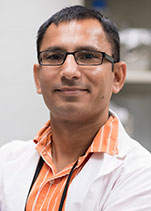 Jogender Tushir-Singh, Ph.D.
Jogender Tushir-Singh, Ph.D.
Researchers at UC Davis have described a potentially feasible antibody-based SARS-CoV-2 targeting design. SARS-CoV-2 exploits the host furin protease system to generate activated spike protein for efficient cell-to-cell transmission.
"We have designed an antibody-based approach that has the potential to interfere with the transmission chain of SARS-CoV-2. The COVID-19 vaccines are a great lifesaver in reducing hospitalizations, severe illness, and mortality. However, with so many increased breakthrough cases with newly emerging variants, multiple studies have now come out indicating that vaccines may not be as effective in controlling the virus's transmissibility. Thus, alternate therapeutic approaches could be helpful along with vaccines and hoping that strategy such as the one we have described could be important to the virology community working on Covid-19 therapeutics here at UC Davis and beyond." said Jogender Tushir-Singh, Ph.D.
Tushir-Singh is a new faculty in the Medical Microbiology and Immunology department and a member of the UC Davis Comprehensive Cancer Center therapeutics program. A large part of his research uses biology-based design and protein-targeting to generate antibodies for cancer. MMI is excited to welcome Tushir-Singh to our UC Davis Health. He would contribute to the depth and strength of our research and academic community here at Davis and Sacramento.
Intracellular bacteria use sophisticated ‘hack’ to evade a host’s immune system
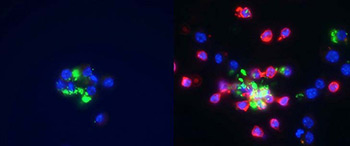
Researchers at UC Davis have discovered a signaling mechanism that allows bacteria like Salmonella to evade destruction by the host’s immune system.
Intracellular bacteria like Salmonella can infect macrophages, a type of immune cell. The Salmonella triggers the death of the host macrophage. It then tricks other immune cells into safely delivering them into another macrophage rather than destroying them.
“The Salmonella outmaneuvers host defenses by using one of our best weapons and turning it against us. It is kind of ingenious,” said Andreas Bäumler, senior author of the study. Bäumler is vice-chair of research and professor in the Department of Medical Microbiology and Immunology at UC Davis School of Medicine.
The study, performed on mouse tissue cultures, was published in Cell Host & Microbe.
Stepping up to the challenge and Making a Difference
MMI Stepping up to the challenge and Making a Difference: Jose Torres is teaching a New Course on Human Virology
 Jose V. Torres, Ph.D.
Jose V. Torres, Ph.D.
MMI Department faculty have stepped up to the educational challenges of building a pipeline of future virologists, infectious disease researchers and public health experts. Jose Torres, Ph.D., has developed a new undergraduate course, “Human Virology” and is teaching it for the first time, this winter quarter (2022).
This course provides insights into the principles of medical virology, current and future viral pandemics and is relevant for undergraduate students who intend to pursue a career in medicine, public health, and biomedical research. Torres is passionate about mentoring and supporting undergraduate students and their education in medical virology and public health.
2021
UC Davis Health Researchers recognized as Highly Cited Researchers 2021
 Jonathan Eisen, Ph.D.
Jonathan Eisen, Ph.D.
 Andreas Bäumler, Ph.D.
Andreas Bäumler, Ph.D.
Congratulations to Professors Jonathan Eisen and Andreas Bäumler, who are among the five UC Davis Health researchers who were recognized today as Highly Cited Researchers by Clarivate, a global leader in providing information and insights to accelerate the pace of innovation.
In its 2021 list of Highly Cited Researchers™, Clarivate identifies some 6,600 researchers from across the globe who demonstrated significant influence in their field through the publication of multiple highly cited papers during the last decade.
Professor Andreas Bäumler awarded Robert Koch Prize 2021
Professor Andreas Bäumler will be awarded the Robert Koch Prize on November 19, 2021 in Berlin. The recognition is for his groundbreaking research on the role of intestinal epithelium in the composition of microbiota and its effects in infectious and inflammatory diseases.
The prize, which includes 120,000 euros, is one of the most prestigious scientific awards in Germany.
Read More about this news article »
Study explains why food high in saturated fat may lead to plaque build-up in arteries
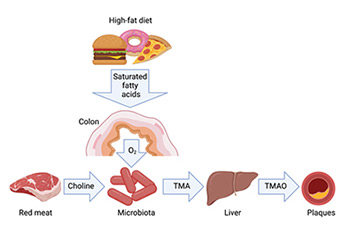
We all know that fatty foods are linked to blocked arteries and a higher risk for heart disease, but why or how the food becomes toxic has remained a mystery, until now. New research involving UC Davis Health may provide an answer.
The study, published Aug. 13 in Science, suggests that consuming food rich in saturated fat and choline - a nutrient found in red meat, eggs and dairy products - increases the number of metabolites that build plaques in the arteries. It also points to a possible drug that can block the effects of the high-fat diet on the gut and the arteries.
“Our study shows how a high-fat diet disrupts the bacterial balance in the gut and leads to the production of harmful substances implicated in cardiovascular diseases,” said Andreas Bäumler, professor of medical microbiology and immunology at UC Davis Health and co-lead author on the study.
Read More about this news article »
Research provides a roadmap to HIV eradication via stem cell therapy
 Satya Dandekar, Ph.D.
Satya Dandekar, Ph.D.
In a groundbreaking study, a team of UC Davis researchers has discovered a special type of stem cell that can reduce the amount of the virus causing AIDS, boosting the body’s antiviral immunity and repairing and restoring the gut’s lymphoid follicles damaged by the simian immunodeficiency virus (SIV), the equivalent of the human immunodeficiency virus (HIV) in non-human primates.
The study, published June 22 in JCI Insight, showed the mechanism through which mesenchymal stem/stromal cells (MSCs) enhance the body’s immune response to the virus. It also provides a roadmap for developing multi-pronged HIV eradication strategies.
“Impaired immune functions in HIV infection and incomplete immune recovery pose obstacles for eradicating HIV,” said Satya Dandekar, senior author of this paper. “Our objective was to develop strategies to boost immunity against the virus and empower the host immune system to eradicate the virus. We sought to repair, regenerate and restore the lymphoid follicles that are damaged by the viral infection.”
Read More about this news article »
Congratulations to Janine LaSalle, recipient of one of this year’s inaugural Cultivating Team Science grant program to incentivize collaboration research awards, UC Davis School of Medicine
 Janine LaSalle, Ph.D.
Janine LaSalle, Ph.D.
The Cultivating Team Science Awards will provide $100,000 annually per team ($200,000 total award) with two-year seed funds for planning, preparation and submission of large team-based applications. The awarded teams will be required to submit an initial application for a program project, U01 or equivalent grant to NIH or other federal funding agency with direct costs of at least $2 million annually by June 2022.
Janine LaSalle, professor of Medical Microbiology and Immunology, UC Davis MIND Institute and co-director of the Perinatal Origins of Disparities Center, will lead her team’s investigation of Precision Biomarkers of Fetal Neurodevelopment and Maternal Dietary Interventions in the Perinatal Origins of Disparities Center.
Precision biomarkers of fetal neurodevelopment and maternal dietary interventions in the Perinatal Origins of Disparities (POD) Center
Despite leadership in technologically advanced biomedical research, health outcomes in the US are often more dependent on zip code than DNA code. Almost half of premature mortality in low-income US populations can be attributed to social determinants of health, including disparities in access to affordable healthy food, potable water, green space, safe housing, clean air and supportive social networks. Developmental Origins of Health and Disease, a premise originating with observations of the long-term effects of perinatal famine in humans and backed by recent advances in the fields of epigenetics and epidemiology, demonstrates that pre-conception and intrauterine exposures have lifelong consequences on health. The perinatal period, defined as pre-conception through early infancy, is thus a critical window for preventive interventions to improve social determinants of health and reduce future healthcare costs.
To address the critical scientific gap in understanding multifactorial perinatal influences on health trajectories and disparities, we have convened a multidisciplinary team to create the UC Davis Perinatal Origins of Disparities (POD) Center. POD is based on the premise that there is no “Nature versus Nurture,” but rather, health trajectories and outcomes must be understood within the context of both Nature and Nurture through cutting-edge technologies. Few research teams have simultaneously integrated data from the social, behavioral, and basic sciences to reflect the critical intersection where nature meets nurture to mitigate health disparities at the beginning of life. The POD Center will leverage expertise from genome sciences, epigenetics, human development, epidemiology, engineering, social welfare policy, and economics to identify phenotypes of health trajectories beginning prenatally that consider biological, social, behavioral, and community level data simultaneously in order to develop, validate, and disseminate preventive interventions for health disparities.
Funds provided from the School of Medicine Cultivating Team Science Award will be specifically used to develop and translate to clinical practice precision biomarkers from “liquid biopsy” of maternal blood, specifically the analysis of cell-free DNA (cfDNA) circulating in serum and plasma.
Congratulations to Maria Mudryj and Kimberly Katleba for their exciting new findings in cancer research
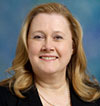 Maria Mudryj, Ph.D.
Maria Mudryj, Ph.D.
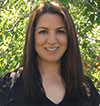 Kimberly Katleba, Ph.D.
Kimberly Katleba, Ph.D.
Congratulations to Professor Maria Mudryj and Kimberly Katleba for their exciting new findings in cancer research. This study found that targeting androgen receptors - a type of protein that is crucial for the function of testosterone – have capacity to destroy cancer cells. A new research publication reports for the first time that a newly identified form of the protein is commonly expressed in bladder tumors and most importantly, depletion this protein target caused death of cancer cells. This collaborative project involved researchers from UC Davis Comprehensive Cancer Center and School of Medicine.
This collaborative research by Maria Mudryj, Professor, Vice Chair of Outreach and Education, and Kimberly Katleba, post-doctoral scholar in the Department of Medical Microbiology and Immunology, was published in Cancer Letters and highlighted here.
2020
11 Professors Elected as AAAS Fellows
 Jonathan Eisen, Ph.D.
Jonathan Eisen, Ph.D.
Jonathan Eisen, is one among the eleven UC Davis professors who have been elected in this year’s class of fellows of the American Association for the Advancement of Science, or AAAS, the world’s largest general scientific society.
The association elevates members to the rank of fellow in recognition of their scientifically or socially distinguished efforts to advance science or its applications.
Read more about this news article »
The Safety Star Program recognizes employees who improve safety at UC Davis
 Briana Young
Briana Young
The Safety Star Program was implemented to recognize campus employees who are making contributions to improve the safety culture at UC Davis. Nominees are eligible for three voting periods.
Briana Young, a Staff Research Associate in Medical Microbiology and Immunology has been chosen as the third Safety Star of 2020.
Read more about Briana and why she won here and nominate a Safety Star today!
High-fat diet with antibiotics use linked to gut inflammation
 Andreas Bäumler, Ph.D.
Andreas Bäumler, Ph.D.
UC Davis researchers have found that combining a Western-style high-fat diet with antibiotic use significantly increases the risk of developing pre-inflammatory bowel disease (pre-IBD). The study, published July 14 in Cell Host and Microbe, suggests that this combination shuts down the energy factories (mitochondria) in cells of the colon lining, leading to gut inflammation.
“Our study found that a history of antibiotics in individuals consuming a high-fat diet was associated with the greatest risk for pre-IBD,” said Andreas Bäumler, professor of medical microbiology and immunology and lead author on the study. “Until now, we didn’t appreciate how different environmental risk factors can synergize to drive the disease.”
Read More about this news article »
Wanted: Field guide to coronaviruses, says UC Davis evolutionary biologist
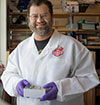 Jonathan Eisen, Ph.D.
Jonathan Eisen, Ph.D.
In this age of COVID-19, Jonathan Eisen says what we really need is a field guide to coronaviruses. We’ll need it when the next new dangerous virus appears, and we are not close.
Eisen, a UC Davis Health professor of microbiology and immunology and an evolutionary biologist in the UC Davis Genome Center, is not trying to scare anyone. But he says if we better understood all coronaviruses, we could have more quickly and effectively fought back against COVID-19.
Read More about this news article »
Satya Dandekar honored with prestigious NIH MERIT award for HIV research
 Satya Dandekar, Ph.D.
Satya Dandekar, Ph.D.
Satya Dandekar, professor of microbiology and the chairperson of the Department of Medical Microbiology and Immunology at UC Davis, has received a prestigious MERIT award from the NIH National Institute of Allergy and Infectious Diseases (NIAID).
MERIT stands for Method to Extend Research in Time. The National Institutes of Health (NIH) presents MERIT awards to outstanding investigators for their superior competence and stellar records of scientific achievement.
Jonathan Eisen is recognized for his efforts for equality
 Jonathan Eisen, Ph.D.
Jonathan Eisen, Ph.D.
Jonathan Eisen, knows he’s an unlikely champion for female representation at scientific conferences. But he also knows someone needs to point out the dearth of women who are speakers at these events.
Read More about this news article »
2019
Mapping the pathway to gut health in HIV and SIV infections
 Satya Dandekar, Ph.D.
Satya Dandekar, Ph.D.
A UC Davis study found that the damaged gut lining (known as leaky gut) in monkeys infected with chronic simian immunodeficiency virus (SIV), an HIV-like virus, was rapidly repaired within five hours of receiving Lactobacillus plantarum bacteria.
The study, published in the PNAS, linked chronically inflamed leaky gut to the loss of PPARα signaling (a nuclear receptor protein responsible for regulating cell metabolism) and subsequent damage to mitochondria - the cell’s power house.
Read More about this news article »
UC Davis Researchers Are Highly Cited
 Andreas Bäumler, Ph.D.
Andreas Bäumler, Ph.D.
Departmental faculty member, Andreas Bäumler, Ph.D., is one among the sixteen UC Davis researchers that have been named in the annual Highly Cited Researchers 2019 list released by the Web of Science Group, which compiles statistics on scientific publishing. The list identifies scientists and social scientists who have published multiple papers ranking in the top 1 percent by citations in a particular field and year, over a 10-year period.
Read More about this news article »
Perinatal Origins of Disparities Center
Center leaders: Leigh Ann Simmons, professor and chair of the Department of Human Ecology; Janine LaSalle, professor, Department of Medical Microbiology and Immunology, and associate director of the Genome Center
 Janine LaSalle, Ph.D.
Janine LaSalle, Ph.D.
Despite all of the incredible advances in health care technology over recent years, health outcomes in the United States are often more dependent on zip code than DNA code. The Perinatal Origins of Disparities (POD) Center will investigate why and how some groups of people are more likely to be sicker than others, and then develop ways to prevent those disparities when they often begin — pre-conception to infancy. Since the challenge of preventing health disparities will never be addressed through a single approach, the POD Center brings faculty together from a wide range of fields: genome sciences, human development, epidemiology, biomedical engineering, social welfare policy and health economics. This multidisciplinary group will examine biological, social, behavioral and community-level data simultaneously to develop, test and share prevention strategies and tools.
Read More about this news article »
Vaccine aims to protect babies, pregnant women from infection
 Dennis Hartigan-O'Connor, M.D., Ph.D.
Dennis Hartigan-O'Connor, M.D., Ph.D.
Research shows a new vaccine developed by UC Davis holds promise for slowing an infection that's a concern in pregnant women and people with weakened immune systems.
The vaccine was designed to treat cytomegalovirus (CMV). CMV is an infection that's spread by direct contact with saliva, urine or other bodily fluids, especially in babies and young children. It can become severe for infants and even life-threatening for people with weak immune systems.
A UC Davis team, that includes Dennis Hartigan-O'Connor, conducted the study in monkeys and found the vaccine slowed the spread of CMV for three months. The team simulated how the virus spreads in daycare centers and schools. They also targeted a viral gene that prevents the immune system from responding to the infection.
Jonathan Eisen is a recipient of ADVANCE Scholar Award for 2018-19
 Jonathan Eisen, Ph.D.
Jonathan Eisen, Ph.D.
Jonathan Eisen, is one of the recipients of the ADVANCE Scholar Award recipients for 2018-19, announced by the UC Davis Office of Diversity, Equity, and Inclusion.
These ADVANCE Scholars improve gender equity in STEM through their teaching, research and service and encourage research, leadership, and outreach to underserved communities and/or mentorship of underrepresented students.
The ADVANCE Scholar Awards highlight and celebrate the contributions that STEM faculty at UC Davis have made to their fields through outstanding scholarship and mentorship.
Read More about this news article »
Dennis Hartigan-O'Connor selected as the 2019 class of Chancellor’s Fellow
 Dennis Hartigan-O'Connor, M.D., Ph.D.
Dennis Hartigan-O'Connor, M.D., Ph.D.
Chancellor Gary S. May has named the 2019 class of Chancellor’s Fellows, the university’s annual honors program recognizing associate professors for high achievement in the quality and excellence of research and teaching.
In this 19th year of the program, May named 10 Chancellor’s Fellows: two biologists (one who studies grapevine disease, the other how insects fly), an artist and a poet, a medical microbiologist, a molecular geneticist and a veterinary epidemiologist, a psychologist and a mathematician, and a physicist looking for “dark matter.”
Read More about this news article »
2018
Sankaran-Walters received the Excellence in Teaching Award
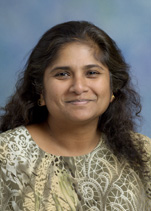 Sankaran-Walters, Ph.D.
Sankaran-Walters, Ph.D.
The Excellence in Teaching Award recognizes and rewards Betty Irene Moore School of Nursing faculty members for their outstanding efforts in teaching and their impact on the education of the school’s students. The 2018 Teaching Award goes to Assistant Adjunct Professor Sam Sankaran-Walters.
Sankaran-Walters was nominated for her passion for teaching and as one nominee said, her heart for students. Her accessible knowledge and approachable style resonates with students who know she always wants them to succeed. She can explain complicated processes in simple terms and is a straight-shooter. One nominee likened her compassion and understanding to Betty Irene Moore, who advocated for change in health care after she experienced a potentially harmful medical error. Sankaran-Walters is a partner for students and always ready to find solutions to help them and improve the situation for others.
Renée Tsolis elected to American Academy of Microbiology
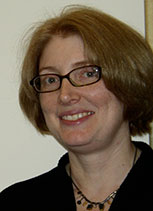 Renee Tsolis, Ph.D.
Renee Tsolis, Ph.D.
Renée Tsolis, Professor of Microbiology and Immunology, is one of 96 new fellows elected to the American Academy of Microbiology in 2018. Fellows of the American Academy of Microbiology, an honorific leadership group within the American Society for Microbiology, are elected annually through a highly selective, peer-review process, based on their records of scientific achievement and original contributions that have advanced microbiology. The new fellows will be honored at the ASM Microbe 2018 conference in June.
Sleep disturbances, genetic alterations and Prader-Willi syndrome
 Janine LaSalle, Ph.D.
Janine LaSalle, Ph.D.
Research by Janine LaSalle, Professor in the Department of Medical Microbiology and Immunology, was published in Nature Communications.
UC Davis researchers find new way to defeat HIV latency
 Satya Dandekar, Ph.D.
Satya Dandekar, Ph.D.
 Guochun Jiang
Guochun Jiang
HIV, the virus that causes AIDS, has a secret life. Though anti-retroviral therapy can reduce its numbers, the virus can hide and avoid both treatments and the body’s immune response.
Researchers at UC Davis Health, together with colleagues at UC San Francisco and the University of North Carolina at Chapel Hill, have found that increased crotonylation, an epigenetic mechanism that governs gene expression, might be the key to making HIV come out of hiding and become susceptible to anti-HIV drugs. Their study is published in The Journal of Clinical Investigation.
2017
Satya Dandekar, elected Fellow of American Association for the Advancement of Science (AAAS)
 Satya Dandekar, Ph.D.
Satya Dandekar, Ph.D.
Satya Dandekar, Professor and Chair of Medical Microbiology and Immunology, is one among the three UC Davis Health faculty members who have been elected to the newest class of fellows of the American Association for the Advancement of Science (AAAS) for their scientifically or socially distinguished efforts to advance science or its applications. They are among 15 UC Davis faculty to receive the honor.
Read more about this news article »
Jonathan Eisen Joins Zymo Research Corp.'s Scientific Advisory Board
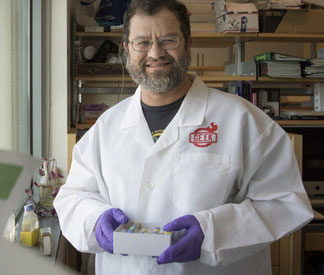 Jonathan Eisen, Ph.D.
Jonathan Eisen, Ph.D.
The Zymo Research Corp. Board of Directors has announced the appointment of Jonathan Eisen, Biologist, to its Scientific Advisory Board, effective immediately.
Jonathan Andrew Eisen currently works at the University of California, Davis. He holds appointments in the Department of Evolution and Ecology in the College of Biological Sciences and in the Department of Medical Microbiology and Immunology in the School of Medicine. Eisen's lab is located at the UC Davis Genome Center. His areas of expertise include evolutionary biology, genomics, microbiology and computational biology. He has been actively involved in the "open science" movement especially in the move towards more "open access" publishing. In addition, he is an active and award-winning science communicator.
Read more about this news article »
How dietary fiber helps the intestine maintain gut health
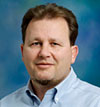 Andreas Bäumler, Ph.D.
Andreas Bäumler, Ph.D.
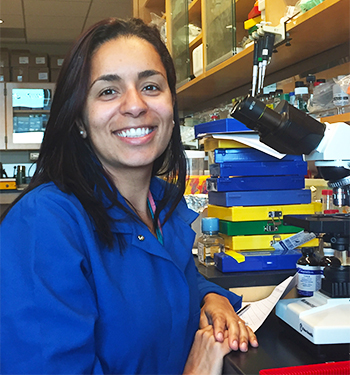 Mariana X. Byndloss
Mariana X. Byndloss
UC Davis Health researchers have discovered how by-products of the digestion of dietary fiber by gut microbes act as the right fuel to help intestinal cells maintain gut health.
The research, published August 11 in the journal Science, is important because it identifies a potential therapeutic target for rebalancing gut microbiota and adds to a growing body of knowledge on the complex interplay between gut microbiota and dietary fiber.
An accompanying Insights / Perspectives article in the same issue of the journal describes gut microbes as “partners” in the body’s defense against potential infectious agents, such as Salmonella.
“Our research suggests that one of the best approaches to maintaining gut health might be to feed the beneficial microbes in our intestines dietary fiber, their preferred source of sustenance,” said Andreas Bäumler, professor of medical microbiology and immunology at UC Davis Health and senior author of the study.
Contaminated Medical Marijuana Believed to have Killed Cancer Patient
 George Thompson, M.D.
George Thompson, M.D.
A rare fungal infection has killed a California man undergoing cancer treatment and it’s believed he got it from medical marijuana, CBS Los Angeles reports.
The treatment left the man’s immune system compromised, but his death still surprised doctors because he was relatively young and his cancer was beatable. He was using medical marijuana to fend off the treatment’s effects. After his death, testing of 20 medical marijuana samples from across the state found the vast majority were contaminated with dangerous bacteria and fungi.
“It started with a couple patients that were undergoing very intensive chemotherapy and a stem cell therapy, and those patients were very immune-compromised,” explained Joseph Tuscano of the University of California, Davis Cancer Center.
The California man was one of those patients who was already in a very serious cancer fight. Then that fight suddenly became much more complicated with a relatively rare but particularly lethal fungal infection.
“We thought it was strange to have cases of such a bad fungal disease in such a short amount of time,” said George Thompson, a fungal infection expert with UC Davis Medical Center.
Read more about this news article »
How maternal immune response to allergies may affect neurodevelopment
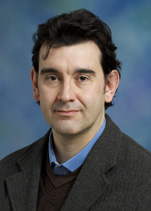 Paul Ashwood, Ph.D.
Paul Ashwood, Ph.D.
Researchers at UC Davis have published a study that illustrates how maternal immune activation could affect neurodevelopment in offspring.
Common characteristics that underlie many neuropsychiatric disorders such as autism spectrum disorder, schizophrenia, attention-deficit/hyperactivity disorder (ADHD) and bipolar disorder suggest they may share common causes. Epidemiological and clinical studies have identified links between these disorders and a family history of immune conditions. Most notably, mothers who have experienced increased immune activity during pregnancy are more likely to have a child with one of these neuropsychiatric disorders.
Led by Paul Ashwood, professor in the UC Davis Department of Medical Microbiology and Immunology, the study demonstrated that young mice showed increased hyperactivity and repetitive behaviors when mothers were exposed to allergens. The study findings were published in a paper entitled “Behavioral impact of maternal allergic-asthma in two genetically distinct mouse strains” in the journal Brain, Behavior, and Immunity.
Award for Career Excellence in Medical, Urban, and Veterinary Entomology
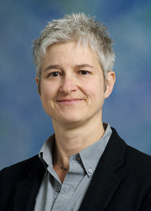 Shirley Luckhart, Ph.D.
Shirley Luckhart, Ph.D.
Departmental faculty member, Shirley Luckhart, Ph.D., has been awarded the “Award for Career Excellence in Medical, Urban, and Veterinary Entomology”.
Read more about this award from here »
2016
Genetics and environment combine to influence autism-associated genes
 Janine LaSalle, Ph.D.
Janine LaSalle, Ph.D.
Researchers at UC Davis have shown that a well-known neurotoxin (PCB 95) and a chromosomal duplication (Dup15q) have a profound impact on DNA methylation, the epigenetic process that can influence gene activity. These cumulative genetic and environmental “hits” alter the epigenetic landscape during development, altering genes linked to autism spectrum disorder (ASD). The study was published in the journal Cell Reports.
“We found multi-hit, cumulative impacts that are affecting epigenetic signatures in a common group of genes involved in synapses and autism,” said Janine LaSalle, professor in the Department of Medical Microbiology and Immunology. “This study is an example of how you can have two independent effects that, when combined, affect a larger set of genes important in the developing brain.”
Gut pathogens thrive on body’s tissue-repair mechanism
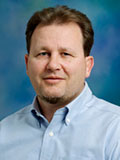 Andreas Bäumler, Ph.D.
Andreas Bäumler, Ph.D.
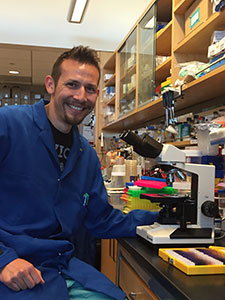 Christopher-Lopez
Christopher-Lopez
Why do some foodborne bacteria make us sick? A paper published Sept. 16 in the journal Science has found that pathogens in the intestinal tract cause harm because they benefit from immune system responses designed to repair the very damage to the intestinal lining caused by the bacteria in the first place.
”The finding is important because it explains how some enteric pathogens can manipulate mammalian cells to get the oxygen they need to breathe,” said Andreas Bäumler, a professor of medical microbiology and immunology at UC Davis School of Medicine and lead author of the study. “It also offers new insight into developing strategies targeting the metabolism of the intestinal lining to prevent the expansion of harmful bacteria in the gut, a situation that is exacerbated by the overuse of antibiotics.”
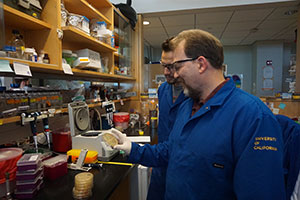 A healthy large intestine is mostly free of oxygen, and the beneficial microbes residing there thrive in this anaerobic environment. In contrast, enteric pathogens, such as Escherichia coli in humans or Citrobacter rodentium in mice, need oxygen to survive.
A healthy large intestine is mostly free of oxygen, and the beneficial microbes residing there thrive in this anaerobic environment. In contrast, enteric pathogens, such as Escherichia coli in humans or Citrobacter rodentium in mice, need oxygen to survive.
Bäumler’s team discovered how these pathogens change the gut environment to favor their own growth.
“Enteric pathogens deploy virulence factors that damage the intestinal lining and cause diarrhea,” Bäumler said. “To repair the damage, the body accelerates the division of epithelial cells that form the intestinal lining, which brings immature cells to the mucosal surface. These new cells contain more oxygen and wind up increasing oxygen levels in the large bowel, creating an environment that allows gut pathogens like E. coli to outcompete the anaerobic-loving resident microbes.”
 Bäumler’s research has important implications for developing new treatment strategies that target factors that compromise the intestinal-lining function or bolster microbiota composition to offer either resistance or assistance to invading pathogens.
Bäumler’s research has important implications for developing new treatment strategies that target factors that compromise the intestinal-lining function or bolster microbiota composition to offer either resistance or assistance to invading pathogens.
“The rise of antibiotic-resistant strains of bacteria has become a major public health threat worldwide, Bäumler said. “As more bacterial strains do not respond to the drugs designed to kill them, the advances made in treating infectious diseases over the last 50 years are in jeopardy.”
This year, the Centers for Disease Control and Prevention identified three drug-resistant organisms – Clostridium difficile, Carbapenem enterobacteriaceae and Neisseria gonorrhoeae – as requiring urgent attention, and in May, a report commissioned by the UK government predicted that by 2050 antimicrobial-resistant infections could claim 10 million lives a year and cost up to $100 trillion from the global economy.
Understanding how gut pathogens manipulate the body’s natural defense mechanisms to grab hold and contribute to abnormal states within and beyond the GI tract is a burgeoning area of research at UC Davis. Scientists from schools and colleges across the campus are investigating antibiotic resistance as well as the influence that gut-flora imbalances have on many conditions, including brain health and behavior, obesity, inflammatory bowel disease, irritable bowel syndrome, GI cancers, cardiovascular disease, fatty liver disease, autism, arthritis and asthma.
Antibiotics increase nutrient availability for pathogens
 Andreas Bäumler, Ph.D.
Andreas Bäumler, Ph.D.
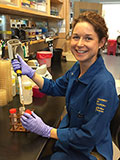 Franziska Faber, Ph.D.
Franziska Faber, Ph.D.
UC Davis study details how treatment with antibiotics increases availability of oxidized sugars to generate nutrients that benefit the growth of bacterial pathogens.
The research on antibiotics has traditionally focused on the mechanisms by which they contribute to controlling the growth of bacteria as well as on the development of new drugs. But it has also been known that, paradoxically, some bacterial pathogens can benefit from the consequences of antibiotic treatment in causing disease. However, the mechanisms behind this relation remain elusive.
The paper can be found here (PDF)
Antibiotics enable pathogens to breath in the gut
Antibiotics are essential for fighting bacterial infection, but paradoxically, in some instances they can make us more prone to developing diarrhea. That is because antibiotics don’t just kill “bad” bacteria; they can also kill the “good” ones normally residing in our gut to protect us from pathogens. However, the mechanisms by which our resident gut microbes confer protection against pathogens, such as Salmonella, remain poorly understood. In a paper published April XX, 2016, researchers from UC Davis and UT Southwestern figured out why.
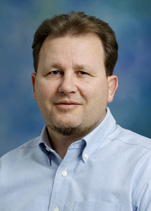 Andreas Bäumler, Ph.D.
Andreas Bäumler, Ph.D.
Our body absorbs nutrients in the small intestine, but our digestive tract cannot break down natural fibers from vegetables. Thus fibers pass through into the large intestine, which is teaming with beneficial microbes that are specialized on breaking down this plant material into a short organic acid, termed butyrate. To generate energy for water absorption, our cells lining the large intestine then use oxygen to burn microbe-derived butyrate; that’s how we consume fiber. A team led by Baumler found that when mice were given antibiotics, the beneficial microbes were depleted along with butyrate, thus preventing the cells lining the large intestine to consume oxygen, which dramatically increased oxygen availability in the gut lumen. Unlike our beneficial microbes, which specialize on growing in the complete absence of oxygen, Salmonella was able to benefit from the resulting increase in oxygen availability, which drove a bloom of the pathogen in the gut after antibiotic treatment. Thus by preventing beneficial microbes from providing nutrition for the cells lining our large intestine, antibiotic treatment can make us more susceptible to Salmonella infection. This finding will help to devise strategies to prevent this unwanted side effect of antibiotic treatment.
Shirley Luckhart: Outstanding Teacher and Mentor
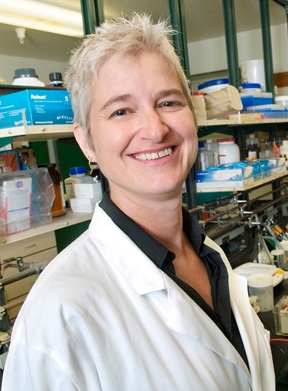 Shirley Luckhart, Ph.D.
Shirley Luckhart, Ph.D.
For outstanding teaching and mentoring, molecular biologist Shirley Luckhart has been named the recipient of the 2016 “Award for Excellence in Service to Graduate Students,” sponsored by the UC Davis Graduate Student Association.
“This is a wonderful surprise,” said Luckhart, professor with the Department of Medical Microbiology and Immunology and adjunct professor in the Department of Entomology and Nematology.
She will receive the award on April 8 at the annual Interdisciplinary Graduate and Professional Student Award Banquet.
Luckhart, whose expertise includes molecular cell biology and biochemistry of malaria parasite transmission, was singled out for creating a thriving lab environment and her drive to help her students succeed.
Cells sensing hostile takeover by pathogens also sound alarm to alert immune system
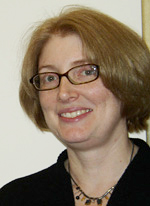 Renee Tsolis, Ph.D.
Renee Tsolis, Ph.D.
Researchers at UC Davis have discovered an unexpected link between how the immune system sounds an alarm when its cells are taken over by pathogens during an infection and how an inflammatory response is triggered.
The finding of this novel link, published in the journal Nature on March 23, is important because it helps researchers understand how a cell senses bacterial or viral infection, and how these pathways are linked to inflammatory diseases, such as inflammatory bowel disease, diabetes and atherosclerosis.
2015
Waking up HIV - Two compounds show great potential to rouse latent virus
Highly active anti-retroviral therapy (HAART) has helped millions survive the human immunodeficiency virus (HIV). Unfortunately, HIV has a built-in survival mechanism, creating reservoirs of latent, inactive virus that are invisible to both HAART and the immune system.
Read more here: United Press International wire service (UPI), Medical News Today, BBC News, The Week (UK), Daily Mail (UK), SacBee Article
The study was published in PLoS Pathogens Journal.
Internships move UC Davis doctoral students beyond academia
Some doctoral students at the University of California, Davis, are going far beyond campus labs and academia. They are engaging in practical work at a leading pharmaceutical company, studying air pollution for a state agency and researching malaria in Uganda.
2014
Congratulations to Michael J. Leibowitz, professor, Medical Microbiology and Immunology as he was one of 6 UC Davis professors in newest class of AAAS fellows
 The association announced the new class on Monday (Nov. 24). The membership elected 401 new fellows in all, in recognition of their contributions to innovation, education and scientific leadership. UC Davis, with its six new members, now has a total of 152 AAAS fellows.
The association announced the new class on Monday (Nov. 24). The membership elected 401 new fellows in all, in recognition of their contributions to innovation, education and scientific leadership. UC Davis, with its six new members, now has a total of 152 AAAS fellows.
Read more about this news article here »
Surprising discovery: HIV hides in gut, evading eradication
Researchers at UC Davis have made some surprising discoveries about the body's initial responses to HIV infection. Studying simian immunodeficiency virus (SIV), the team found that specialized cells in the intestine called Paneth cells are early responders to viral invasion and are the source of gut inflammation by producing a cytokine called interleukin-1 beta (IL-1β).
Though aimed at the presence of virus, IL-1β causes breakdown of the gut epithelium that provides a barrier to protect the body against pathogens. Importantly, this occurs prior to the wide spread viral infection and immune cell killing. But in an interesting twist, a beneficial bacterium, Lactobacillus plantarum, helps mitigate the virus-induced inflammatory response and protects gut epithelial barrier. The study was published in the journal PLoS Pathogens.
One of the biggest obstacles to complete viral eradication and immune recovery is the stable HIV reservoir in the gut. There is very little information about the early viral invasion and the establishment of the gut reservoir.
"We want to understand what enables the virus to invade the gut, cause inflammation and kill the immune cells," said Satya Dandekar, lead author of the study and chair of the Department of Medical Microbiology and Immunology at UC Davis.
"Our study has identified Paneth cells as initial virus sensors in the gut that may induce early gut inflammation, cause tissue damage and help spread the viral infection. Our findings provide potential targets and new biomarkers for intervening or blocking early spread of viral infection," she said.
Read more here, Published in Science Daily »
Breast versus bottle feeding in rhesus monkeys
Infants receiving different diets after birth develop distinct immune systems

Dennis Hartigan-O'Connor recently had a study published in Science Translational Medicine on September 3, 2014, researchers from the California National Primate Research Center (CNPRC) at UC Davis and from UC San Francisco have shown that breast-and bottle-fed infant rhesus macaques develop different immune systems.
Diet has a strong influence on the intestinal microbiota in both humans and animal models. It is well established that microbial colonization is required for normal development of the immune system and that specific microbial constituents prompt the differentiation or expansion of certain immune cell subsets. Nonetheless, it has been unclear how profoundly diet might shape the primate immune system or how durable the influence might be. We show that breast-fed and bottle-fed infant rhesus macaques develop markedly different immune systems, which remain different 6 months after weaning when the animals begin receiving identical diets. In particular, breast-fed infants develop robust populations of memory T cells as well as T helper 17 (TH17) cells within the memory pool, whereas bottle-fed infants do not. These findings may partly explain the variation in human susceptibility to conditions with an immune basis, as well as the variable protection against certain infectious diseases.
Read more here, Published in Science Translational Medicine »
U.S. News' ranks UC Davis Medical Center programs among the nation's best
UC Davis Medical Center has ranked as one of the nation’s best hospitals for 2014-15 in 10 adult medical specialties by U.S. News and World Report. The annual U.S. News Best Hospitals rankings, released July 15, recognize hospitals that excel in treating patients with the most serious and challenging injuries and illnesses.
“The results of the U.S. News and World Report survey reflect the excellence and compassion of everyone here who cares for our patients,” said Ann Madden Rice, chief executive officer, UC Davis Medical Center.
2013
New Insights into how genes turn on and off
Janine LaSalle, professor in the Department of Medical Microbiology and Immunology, in conjunction with researchers at the University of British Columbia, have shed new light on methylation, a critical process that helps control how genes are expressed. Her paper, titled "The human placenta methylome" was published online this week in the Proceedings of the National Academy of Sciences (PNAS).
In addition to enhancing our understanding of epigenetics, this work could influence cancer research and help illuminate how environmental toxins affect fetal development.
Researchers discover molecular target for the bacterial infection brucellosis
Renee Tsolis’ research group has uncovered a potential drug target for the development of an effective therapy against the debilitating, chronic form of the bacterial disease brucellosis, which primarily afflicts people in Mediterranean and Middle Eastern countries.
Paul Ashwood co-author on 2 autism related papers
Paul Ashwood, a professor in Med Micro and a researcher in the MIND institute, is co-author on two papers published in July:
- Identification of specific fetal antigens attacked by maternal antibodies
- Findings of how exposure to prenatal maternal antibodies affects behavior, development in offspring
UC Davis researchers discover how cells distinguish friend from foe
Andreas Baumler, professor in the department of Medical Microbiology and Immunology at UC Davis, and his team have shown how the innate immune system distinguishes between dangerous pathogens and friendly microbes. Like burglars entering a house, hostile bacteria give themselves away by breaking into cells. However, sensing proteins instantly detect the invasion, triggering an alarm that mobilizes the innate immune response. This new understanding of immunity could ultimately help researchers find new targets to treat inflammatory disorders. The paper, titled "Manipulation of small Rho GTPases is a pathogen-induced process detected by NOD1" was published in Nature on March 31.
Diseases on the move because of climate change

George Thompson, assistant professor in the Department of Medical Microbiology and Immunology, was interviewed as part of a USA today article highlighting how climate change is affecting the movement of infectious diseases across the United States. Thompson is a specialist on Valley Fever, which has seen a ten-fold increase in infections since 1998.
Read more about climate change spreading diseases to new areas.
Andreas Baumler finds key to growth of "bad" bacteria in inflammatory bowel disease
Scientists have long puzzled over why “bad” bacteria such as E. coli can thrive in the guts of those with inflammatory bowel disease (IBD), causing serious diarrhea. Now UC Davis researchers have discovered the answer—one that may be the first step toward finding new and better treatments for IBD.
2012
Thompson given IDSA award
The Infectious Diseases Society of America (IDSA) has awarded Angie Gelli, Ph.D. of the Department of Pharmacology, and George R. Thompson, M.D. a faculty member in the Department of Medical Microbiology and Immunology, the 2012 Program committee Choice Award for their work on invasion of the central nervous system by Cryptococcus spp.
Their work was highlighted at an awards presentation on the opening night of the conference held in San Diego, CA during which only 4 presentations were honored for outstanding scientific research.
Together, Gelli and Thompson were able to determine the role of a secreted metalloprotease that is required for invasion into the central nervous system and hope to further characterize both the activity and expression of this enzyme in a human cohort in future studies.
BRCMS awards Aicha Toure for best poster presentation
The Annual Biomedical Research Conference for Minority Students has awarded Aicha Toure best poster presentations in the discipline of Immunology for her poster titled: “Increased Proliferation of Intestinal Epithelial Cells In Early SIV Infection.” Aicha is a senior undergraduate student who is majoring in Biological Sciences with an emphasis in Medical Microbiology. During the 2012-13 academic year she is participating in an undergraduate research internship in the lab of Satya Dandekar in the Department of Medical Microbiology and Immunology, and is investigating changes in intestinal epithelial integrity during SIV infection.
Cases of Valley fever on the Rise
George Thompson, assistant professor and assistant director of the coccidioidomycosis serology laboratory, comments on the rising number of cases of Valley Fever seen throughout the central valley.
UC Davis-led conference promotes new collaborations in Brazil
An interdisciplinary delegation of researchers and educators, led by UC Davis, met this month at the Integrated Biological Networks Driving Disease Outcomes conference in Uberlândia, Brazil, to explore new opportunities for collaboration with the Brazilian Research Network in the biomedical and translational sciences.
Co-chairs of the conference were Satya Dandekar, professor and chair of medical microbiology and immunology at UC Davis School of Medicine, and Luiz Goulart, a professor at UFU's Institute of Genetics and Biochemistry and visiting professor in UC Davis' medical microbiology and immunology department.
MMI Department Chair Receives RISE Award
Satya Dandekar, professor and chair of Medical Microbiology and Immunology, has been awarded funding from the new Research Investments in Sciences and Engineering (RISE) program to conduct innovative, multidisciplinary research in areas of strategic importance to California, the nation and the world.
Established by the UC Davis Office of Research earlier this year, the program has awarded a total of $10 million to support 12 research projects over the next three years. Five projects are led by UC Davis Health faculty. See the story here.
Med Micro researcher receives grant from American Heart Association
Arina Marijke Keestra, an Assistant Project Scientist in Andreas Baumler’s laboratory, received a prestigious National Scientist Development Grant from the American Heart Association, a four-year award totaling $308,000. The National Scientist Development Grant from the American Heart Association supports highly promising beginning scientists in their progress toward independence by encouraging and adequately funding research projects that can bridge the gap between completion of research training and readiness for successful competition as an independent investigator. The long-range goal of Keestra’s research supported by the National Scientist Development Grant is to elucidate pathways of innate immunity that can distinguish harmless microbes from pathogens, thereby enabling the host to mount responses that are commensurate with the threat.
UC Davis dermatologist among scientists honored with Presidential award
Emanual Maverakis, assistant professor of dermatology at UC Davis School of Medicine, joins a highly select group later this month in a White House ceremony honoring recipients of this year's Presidential Early Career Awards for Scientists and Engineers, the highest honor bestowed by the United States government on outstanding scientists and engineers in the early stages of their independent research careers.
Immune System weaves cobweb-like nanonets to snag intestinal microbes
A team of researchers led by Charles Bevins has found that human alpha-defensin 6 (HD6) -- a key component of the body's innate defense system -- binds to microbial surfaces and forms "nanonets" that surround, entangle and disable microbes, preventing bacteria from attaching to or invading intestinal cells.
UC Davis Microbiologist leads study to identify HIV vaccine target
Dennis Hartigan-O'Connor, a new assistant professor in the UC Davis Department of Medical Microbiology, is the principal investigator of a study that has identified a potential new target for developing therapies or vaccines for HIV.
Shirley Luckhart receives outstanding mentor award
Congratulations to UC Davis molecular biologist Shirley Luckhart, professor of Medical Microbiology and Immunology (MMI) and a graduate student advisor with the UC Davis Department of Entomology! She’s just received a 2012 Outstanding Mentor Award from the UC Davis Consortium for Women and Research. Luckhart, an international authority on malaria, was nominated through a joint effort of her 15-member lab, and supported by former students, postdocs and faculty colleagues. Writing letters of support were doctoral candidates Anna Drexler and Elizabeth Glennon; postdoctoral scholar Nazzy Pakpour; and MMI associate professor Maria Mudryj.
UC Davis MIND Institute researchers present on autism at AAAS Annual Meeting in Vancouver
Janine LaSalle, professor in the Department of Medical Microbiology and Immunology and Isaac Pessah, Director of the UC Davis Children's Center for Environmental Health and Disease Prevention led a symposium on relationships between genetic, epigenetic and environmental influences on the development of autism in children during the American Association for the Advancement of Science (AAAS) Annual Meeting, Feb. 16 -18 in Vancouver, Canada.
The research findings of LaSalle indicate that exposure to even low levels of flame retardants may affect the brain of a developing fetus and possibly contribute to autism. This story was also covered by MyHealthNewsDaily.com and IrishTimes.com.
Eisen elected as a fellow in American Academy of Microbiology
Jonathan A. Eisen, professor of medical microbiology and immunology at UC Davis Health, has been elected as a fellow in the American Academy of Microbiology, the honorific leadership group of the American Society for Microbiology, which is the world's oldest and largest life-science organization.
Barbara Shacklett's research highlighted in Science Daily
Shacklett’s paper titled "Myeloid dendritic cells isolated from tissues of SIV-infected Rhesus macaques promote the induction of regulatory T cells" is highlighted in the February 14th edition of Science Daily. The paper was published in the January 28, 2012 issue of AIDS.
SIV Infection May Lead to Increase in Immune-Suppressive Treg Cells
2011
Research led by Paul Ashwood has been honored by Autism Speaks as one of the top 10 Research Achievements of 2011
Ashwood’s paper titled "Elevated plasma cytokines in autism spectrum disorders provide evidence of immune dysfunction and are associated with impaired behavioral outcome" found significantly altered adaptive cellular immune function in children with autism spectrum disorders that may reflect dysfunctional immune activation, and that these alterations may be linked to disturbances in behavior and developmental functioning. It was published in January 2011 in the journal Brain, Behavior and Immunity. A link to Ashwood's paper can be found here.
Thompson and Pappagianis paper cited as Top Ten Paper
George Thompson and Demosthenes Pappagianis were coauthors on a paper recently cited as one of the top 10 papers in clinical mycology at the 51st Annual Interscience Conference on Antimicrobial Agents and Chemotherapy (ICAAC) attended by over 10,000 medical professionals. Their paper describes abrogation of an IgG response in patients treated very early for coccidioidal infection, and defines the mechanism as the indirect suppression of the IgG antigen CTS1 with fluconazole administration. Their report was the first observation of this phenomenon in mycology. A link to the paper can be found here.
Med Micro Signs Agreement with Universidade Federal de Uberlandia, Brazil
An Agreement of Cooperation between the UC Davis Department of Medical Microbiology and Immunology and the Universidade Federal de Uberlandia (UFU), Brazil has been approved by both institutions. The Agreement will promote scientific scholarly activities, research collaborations and international understanding through the exchange of visiting scholars at both institutions. Luiz Goulart, a Visiting Professor from UFU has been based in Med Micro since 2009. It was through his efforts that this agreement was established. Goulart commented “I am very pleased that I have been able to be a part of the process in deepening the relationship between both institutions.”
Pomeroy elected to Institute of Medicine
Congratulations to Claire Pomeroy who has been elected to the Institute of Medicine, one of the nation’s highest honors in health and medicine.
Pomeroy comments on role of social factors in U.S. health care
In this opinion piece, Pomeroy, Vice Chancellor for Human Health Sciences, Dean of the School of Medicine, and Medical Microbiology and Immunology faculty member, comments on the critical need to address the social determinants of health as part of health-care reform.
Maverakis receives NIH Director's New Innovator Award
Emanuel Maverakis has received the NIH Director’s New Innovator Award. The NIH Director's Award programs are designed to reinvigorate and advance science and medicine by enabling investigators to pursue entirely new directions in research, with an emphasis on risk taking and innovation.
New genetically engineered vaccines target Rift Valley Fever
Tilahun Yilma, a Med Micro faculty, is lead author reporting the development of two genetically engineered vaccines to combat the mosquito-borne Rift Valley fever, devastating to livestock and so far confined to Africa and the Middle East.
Chuck Bevins paper featured in New York Times Story
Chuck Bevins recent paper linking Male infertility to a missing protein was featured in a story in The New York Times. The paper was published in the July 20, 2011 edition of Science Translational Medicine.
Study Links Male Infertility to a Missing Protein »
Jonathan Eisen's PLoS ONE paper featured in The Economist
Jonathan Eisen's recent article in PLoS ONE is featured in the March 24th edition of The Economist. The paper discusses Eisen's pursuit of expanding our understanding of the diversity of life.
Claire Pomeroy to be honored as Safety Net Hero
Claire Pomeroy, Chief Executive Officer of UC Davis Health, UC Davis Vice Chancellor for Human Health Services and Dean of the School of Medicine, will be honored as a “Safety Net Hero” at the upcoming Spring Break 2011 fundraiser.
Researchers within Medical Microbiology and Immunology working to find a cure for HIV
In a letter from UC Davis Health CEO and UC Davis Medical School Dean Claire Pomeroy, Medical Microbiology faculty members Satya Dandekar, Barbara Shacklett and Richard Pollard are highlighted for their efforts in finding a cure for the HIV virus.
Med Micro places 12th out of 96 Microbiology departments for NIH funding in 2010
The UC Davis School of Medicine rose to 37th place among 134 schools of medicine in the United States in an annual ranking based on the amount of National Institutes of Health (NIH) research funds received over the course of a year. UC Davis School of Medicine ranked particularly high in basic sciences, including microbiology (12th out of 96 surveyed).
Paul Ashwood paper highlighted by NIEHS
Paul Ashwood’s research into children with autism spectrum disorders is featured in the National Institute of Environmental Health Sciences (NIEHS) Newsletter (March 2011).
Renee Tsolis Appointed to NIH study Section
Renee Tsolis has been appointed to Vaccines Against Microbial Diseases Study Section, Center for Scientific Review, NIH, effective July 1, 2011-June 30, 2015. Tsolis was nominated because of her demonstrated competence and achievements as evidenced by the quality of her research accomplishments, publications and other significant scientific activities, achievements and honors.
Claire Pomeroy named 2011 Businesswoman of the Year
Sacramento Metro Chamber announced that Claire Pomeroy, Faculty member of Medical Microbiology and Immunology, Dean of the UC Davis Medical School and CEO of the UC Davis Health, is its "2011 Businesswoman of the Year." The chamber recognized her for helping make UC Davis "a major contributor to the health care industry and economy of the Sacramento region."
2010
Shirley Luckhart's contribution recognized in Time Magazine
Time magazine selected the "malaria-proof mosquito," developed with the contributions of professor Shirley Luckhart as one of its 50 Best Inventions of 2010.
The 50 Best Inventions of 2010
Andreas Bäumler recognized with top biology paper of 2010
The Scientist selected a study co-written by Andreas Baumler, professor and vice chair of research for the department, as the top paper in biology in 2010.
Barbara Shacklett discusses her work with HIV controllers
Barbara Shacklett discusses her work with HIV controllers and announces the launch of three new clinical studies on women (controllers) in the Bay Area of Northern California.
Paul Ashwood featured in Autism Speaks
Research from Paul Ashwood was featured in this year's newsletter from Autism Speaks.
New research identifies environmental risk factors for autism.
Andreas Baumler to serve on NIH study section
Andreas Baumler has been appointed to serve on the NIH Host Interactions with Bacterial pathogens Study Sections, Center for Scientific Review for the period July 1, 2010 to June 30, 2014. Members are selected for this Study Section on the basis of their demonstrated competence and achievement in their scientific discipline as evidenced by the quality of research accomplishments, publications in scientific journals, and other significant scientific activities, achievements and honors.
2009
Kathy DeReimer to receive NIH New Innovator Funding
Congratulations to Kathy DeRiemer for being awarded a 5 year NIH grant to support her research on Tuberculosis.
Barbara Shacklett appointed to AIP and ANRS study sections
Barbara Shacklett has been appointed to two Study Sections: National Institutes of Health: AIDS Immunology and Pathogenesis ("AIP") Study section (2009-2013); and The French National AIDS Research Agency, ANRS: Study Section CSS1, Host-Virus Interactions (2009-2012).



